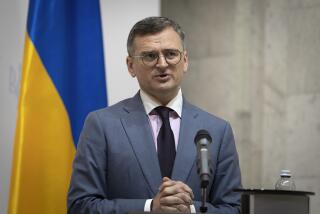Yeltsin Moves to Keep Reformers in New Cabinet
- Share via
MOSCOW — President Boris N. Yeltsin landed back home in Moscow on Saturday and immediately moved to retain key radical economic reformers in the Cabinet now being formed by Russia’s conservative new prime minister.
Yeltsin called a meeting for today with Prime Minister Viktor S. Chernomyrdin, the former Soviet technocrat elected last Monday by the rebellious legislature that ousted Yeltsin protege Yegor T. Gaidar as head of government.
He told reporters that “the reform-minded nucleus created by Gaidar must not be torn apart.”
Yeltsin, who cut short a visit to China after getting word the reformers might be excluded from the Cabinet, said he would press Chernomyrdin to reappoint Gaidar’s young aides so they can continue Gaidar’s fast-track policies of selling off state property, cutting government subsidies to state industries and integrating Russia into the world economy.
With less than an hour’s notice, the unpredictable Russian leader had canceled the last event of his planned three-day China trip--a visit to the southern city of Shenzhen, where Communist rulers are conducting experimental market reforms under tighter state supervision than Yeltsin accepts in Russia.
Russian officials never publicly explained the urgency of his abrupt departure. But Yeltsin noted Chernomyrdin’s obligation to name a Cabinet by Tuesday and said that “the struggle for ministerial posts became too intense” while he was abroad.
Indeed, an atmosphere of intrigue appeared to be settling on Moscow like the darkness that envelops the city for all but about seven hours a day with the approach of Monday’s winter solstice.
Some of the plotting surfaced Friday via an improbable medium, Japan’s Kyodo News Agency. It caused a stir here by reporting that a powerful critic of Yeltsin, Arkady Volsky, a spokesman for Russia’s military-industrial complex, had announced his own Cabinet choices during an interview in Tokyo.
The story listed Yevgeny Saburov and Yuri Yaremenko, moderates favoring a more gradual transition to the free market, as Volsky’s picks to manage the economy. A spokesman for Volsky denied he made the statements.
Meanwhile, Gaidar has been maneuvering to preserve his program and urging his aides to fight for it. Last week he gained appointment to a new post as a presidential adviser on economic policy.
Gaidar’s most influential aides in the Cabinet are two deputy prime ministers, Alexander Shokhin and Anatoly Chubais, Foreign Trade Minister Pyotr Aven and Economy Minister Andrei Nechaev.
Nechaev said in an interview Saturday that Chernomyrdin, though a tough-minded advocate of slowing the reforms to help save industries that cannot survive in a competitive market, does not have an alternative program and will lean on people around him for advice.
“In this sense it would be a mistake (for us) to slam the door” and quit the government, Nechaev said. “If we remain in the government, Gaidar will continue to lead the reforms directly through us.”
Aware of that strategy, the Speaker of Russia’s Parliament, Ruslan I. Khasbulatov, warned the new prime minister that the Gaidar team would do all possible to undermine his work.
By law, the president does not nominate Cabinet ministers but can veto any of the prime minister’s choices. And the Congress of People’s Deputies, in another blow to Yeltsin, last week assumed legislative power to reject nominees to head the ministries of foreign affairs, defense, interior and security.
Yeltsin, who named the current 30-member Cabinet before giving up the prime minister’s job last June, said he was ready to lose “three, four, five people” but would fight for the rest.
Among the most likely to exit is Foreign Minister Andrei V. Kozyrev, scorned at the recent Congress session as too friendly to the West. But since then, Yeltsin has moved to assert more personal control over foreign policy by naming a close aide, Yuri Skokov, to head a new Interdepartmental Foreign Policy Commission.
Andrei Ostroukh of The Times’ Moscow Bureau contributed to this report.
More to Read
Sign up for Essential California
The most important California stories and recommendations in your inbox every morning.
You may occasionally receive promotional content from the Los Angeles Times.













